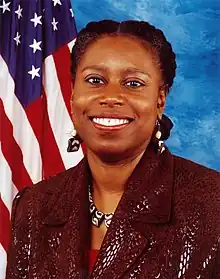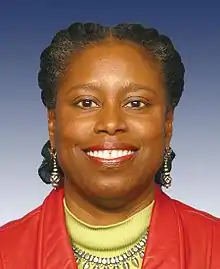
On March 29, 2006, Representative Cynthia McKinney of Georgia had a dispute with Capitol Police. McKinney entered the Longworth House Office Building's southeast entrance after walking around the metal detector at the security checkpoint. She proceeded westward down the ground floor hallway and about halfway down the hallway was grabbed by United States Capitol Police officer Paul McKenna who stated that he had been calling after her "Ma'am, Ma'am!" Two days later Officer McKenna filed a police report claiming that McKinney had "struck his chest with a closed fist." Members of Congress are not required to pass through metal detectors but they are asked to wear identifying lapel pins.
The incident made national headlines and sparked controversies over whether the officers present failed to recognize her as a Member of Congress because she was not wearing the appropriate lapel pin,[1] whether McKinney had just cause to assert that racial profiling played a role in the incident, whether Members of Congress should be required to pass through metal detectors, and even whether McKinney's recent change of hair-style contributed to the incident.
Police report, media attention and charges
Officer McKenna did not arrest McKinney at the time of the incident. He filed a police report later. The following is his exact statement, with C-1 referring to himself and S-1 to Rep. McKinney:
"On 3-29-06, at approximately 0855 hrs. C-1 while performing his official duties as United States Capitol Police Officer and in full uniform, stated that he was physically assaulted by S-1. S-1 struck C-1 in his chest with a closed fist."[2][3]
Congressional pin debate
McKinney was criticized in the media for failing to wear her pin on the morning of March 29, 2006, with critics charging that her failure to do so led to the confrontation. Many other members have not worn the pin since the McKinney–McKenna affair. A July 5, 2006 article in The Hill titled "Pinpoint: After McKinney, many lawmakers still dress without their congressional pins" noted "no discernible pattern" in the decision by Members of Congress regarding the wearing of the Congressional Pin.[4] Several members indicated they followed the same practice as McKinney. House Majority Leader Rep. John Boehner (R-Ohio) said that he was "not a pin-wearing guy." Another Republican Member, Sherwood Boehlert (NY) explained his reason for not wearing a pin, stating "I know who I am." Democratic Member George Miller (CA) said "I've never worn one. I have enough trouble combing my hair in the morning."[5]
McKinney admitted that she was not wearing her pin that morning but opined that the police responsible for protecting lawmakers should recognize the 435 members of Congress on sight and claimed to have shown her congressional identification badge.[6][7]
Initial reactions
McKinney made a brief statement on her own behalf at Howard University on March 31: "Let me be clear: this whole incident was instigated by the inappropriate touching and stopping of me, a female black congresswoman. I deeply regret this incident occurred, and I am certain that after a full review of the facts, I will be exonerated."[8]
McKinney garnered little support. Not one Congressional Democrat chose to join her at a news conference to discuss the situation at Howard University, although Delegate Eleanor Holmes Norton sent a supportive statement to be read at the event. Minority Leader Rep. Nancy Pelosi (D-Cal.) later said on April 5 that she "found it hard to see any set of facts that would justify striking a police officer,"[9] and McKinney's fellow Georgia Democrat, Rep. John Lewis, told McKinney that "she needs to lower the temperature and stop holding press conferences."[10] Outside of Capitol Hill, the Sarasota Democratic Party withdrew from a rally at which McKinney was due to speak.[11]
McKinney declined to discuss the details of the altercation in subsequent media interviews. She has not formally shared her side of the altercation with the public, including: (1) whether she had heard the officer calling after her, or if so, knew that she was the "Ma'am" being called; (2) whether she was aware that an officer of the law was grabbing her, and therefore, assuming she swung her arm in a retaliatory motion; (3) whether she was aware that she was striking an officer of the law, and also; (4) the amount of force behind the alleged blow. The basic facts of the event, aside from McKinney's failure to wear her pin, thus remain in dispute. However, no one, including McKinney, has ever explained why she has never told her side of the story, or attempted to clear up any dispute in the facts.
Race in the incident and aftermath
The story was picked up by many blogs and internet opinion sites with overwhelming rebuke for McKinney coming from conservatives and also left-leaning sources offering negative portrayals of her, as on the comedy show Saturday Night Live, which lampooned her repeatedly on their April 8, 2006 show for "playing the race card." On April 3, former Wonkette editor Ana Marie Cox, interviewed on Joe Scarborough's MSNBC show Scarborough Country, said that "I worry that she [McKinney] makes us [Democrats] all look a little crazy."[12] Some columnists analyzed her hairstyle[13] in a negative light and question the quick participation of musician/actor/social activist Harry Belafonte.
Reacting to the sudden rise in stakes reflected by the potential for criminal indictment, McKinney's attorney, James Myart, spoke in a March 31 news conference suggesting that the officer involved be criminally investigated for accosting ("inappropriately touching") the congresswoman. This charge was not taken seriously by most commentators and media outlets. Myart said the case typified a pattern of police harassment of black Americans. "...my belief is this is no different than that: 'they all look alike'".[14] On April 25, 2006, CNN reported that Myart was no longer representing McKinney.[15] Recently retired U.S. Capitol Police Chief Terrance W. Gainer rejected Myart's charge in an interview with CNN:
- "I've seen our officers stop white members and black members, Latinos, male and females ... It's not an issue about what your race or gender is. It's an issue about making sure people who come into our building are recognized if they're not going through the magnetometer, and this officer at that moment didn't recognize her ... It would have been real easy, as most members of Congress do, to say 'here's who I am' or 'do you know who I am?'"
McKinney has repeatedly stated the incident arose from McKenna's failure to recognize her face, suggesting that a pattern of incidents in which Capitol Police failed to recognize her as a Member of Congress had to do with a general tendency by police in the United States to engage in racial profiling of blacks and therefore tend to handle blacks more roughly.[16]
Apology
On April 6, 2006, after the grand jury was convened to investigate, the Associated Press reported that McKinney had expressed "sincere regret" for the altercation and offered an apology to the House. "There should not have been any physical contact in this incident," McKinney said in a one-minute statement on the House floor. Various commentators, including The Wall Street Journal questioned the sincerity of the apology,[17] noting, among other things, its careful wording, the lack of admission of culpability, and the absence of an apology specifically to the Capitol Police and Officer McKenna.[18]
Potential legal consequences
News reports variously suggested that the police officer as an individual, or the Capitol Police as a whole, were planning to file assault charges. On April 3, 2006, Assistant U.S. Attorney Channing Phillips announced that the Capitol Police had referred the incident to his office for further investigation.[19] On April 5, the Associated Press reported that the case might be referred to a federal grand jury.[20] A sitting Grand Jury was subsequently presented with McKenna's charge of assault of a police officer. Six witnesses were called by the U.S. Attorney's office.
Charges dropped
On June 16, 2006, the grand jury declined to indict McKinney, finding insufficient grounds to proceed.[21][22] Under 18 U.S.C. §111(a), McKinney faced a fine and/or up to eight years in prison if convicted of assaulting an "officer or employee of the United States."
It was suggested on Fox News[9] that McKinney's allegations of racism and sexism were overplayed on her part and had a boomerang effect.
Though not indicted for criminal charges or subjected to disciplinary action by the House, the president of the Fraternal Order of Police said of Officer McKenna, "We're going to make sure the officer won't be harassed. We want the officer to be able talk to experts, who can look at his legal recourses, if he needed to."[23]
See also
References
- ↑ "Rep. McKinney Punches Cop". WXIA-TV ATLANTA. March 30, 2006. Archived from the original on January 14, 2007.
- ↑ "Police report: McKinney hit officer with fist". CNN Washington Bureau. April 19, 2006. Archived from the original on October 26, 2012. Retrieved March 16, 2007.
- ↑ "McKinney report cites assault with 'closed fist'". Atlanta Journal-Constitution. April 19, 2006. Archived from the original on August 24, 2006. Retrieved March 16, 2007.
- ↑ "Pinpoint: After McKinney, many lawmakers still dress without their congressional pins". The Hill. Archived from the original on 2006-11-09.
- ↑ "After McKinney, many lawmakers still dress without their congressional pins". Archived from the original on July 10, 2012.
- ↑ "McKinney Faces Arrest for Scuffle". WXIA-TV ATLANTA. March 30, 2006.
- ↑ See, e.g., A. Jabari, McKinney's Hair & Affair Archived October 13, 2017, at the Wayback Machine, in The Washington Post, 4/10/06)
- ↑ "McKinney Says Police Officer Touched Her 'Inappropriately'". The Washington Post. April 1, 2006. Archived from the original on July 8, 2009. Retrieved May 12, 2010.
- 1 2 "McKinney Reveals Status of Gender, Race". Fox News. April 11, 2006. Archived from the original on April 27, 2006. Retrieved March 16, 2007.
- ↑ "Lewis advises McKinney to stop". The Hill. Archived from the original on February 7, 2007.
- ↑ "Democrats Pull Out Of McKinney Rally". Sarasota Herald-Tribune. Archived from the original on February 20, 2007. Retrieved March 16, 2007.
- ↑ "Archived copy". Archived from the original on January 11, 2007. Retrieved March 16, 2007.
{{cite web}}: CS1 maint: archived copy as title (link) - ↑ Givhan, Robin. "Why a Hairstyle Made Headlines". The Washington Post. Archived from the original on October 26, 2012. Retrieved May 12, 2010.
- ↑ Carl Hulse (1 April 2006). "Congresswoman Accuses Capitol Police Officer of Racial Bias". The New York Times. Archived from the original on 23 March 2021. Retrieved 22 February 2017.
- ↑ "McKinney draws re-election foe, loses attorney". CNN.com. April 25, 2006. Retrieved March 16, 2007.
- ↑ "McKinney Decries 'Inappropriate Touching' by Capitol Police". Fox News. April 1, 2006. Archived from the original on October 12, 2009. Retrieved December 20, 2009.
- ↑ "Throw the book at her". The Wall Street Journal / OpinionJournal. Archived from the original on March 23, 2021. Retrieved March 16, 2007.
- ↑ "McKinney Apologizes". The Hill. Archived from the original on June 30, 2006.
- ↑ "McKinney incident referred to U.S. Attorney's Office". The Associated Press. Archived from the original on April 5, 2007.
- ↑ "Grand Jury to Hear McKinney Run-In Case". The Associated Press. Archived from the original on April 12, 2006. Retrieved January 9, 2017.
- ↑ "My Way". Archived from the original on August 27, 2006. Retrieved March 16, 2007.
- ↑ "McKinney Apologizes Over Scuffle With Officer". The Washington Post. Archived from the original on April 1, 2012.
- ↑ "Officer Considers Lawsuit Against McKinney". WSBTV ATLANTA. Archived from the original on April 13, 2006.
